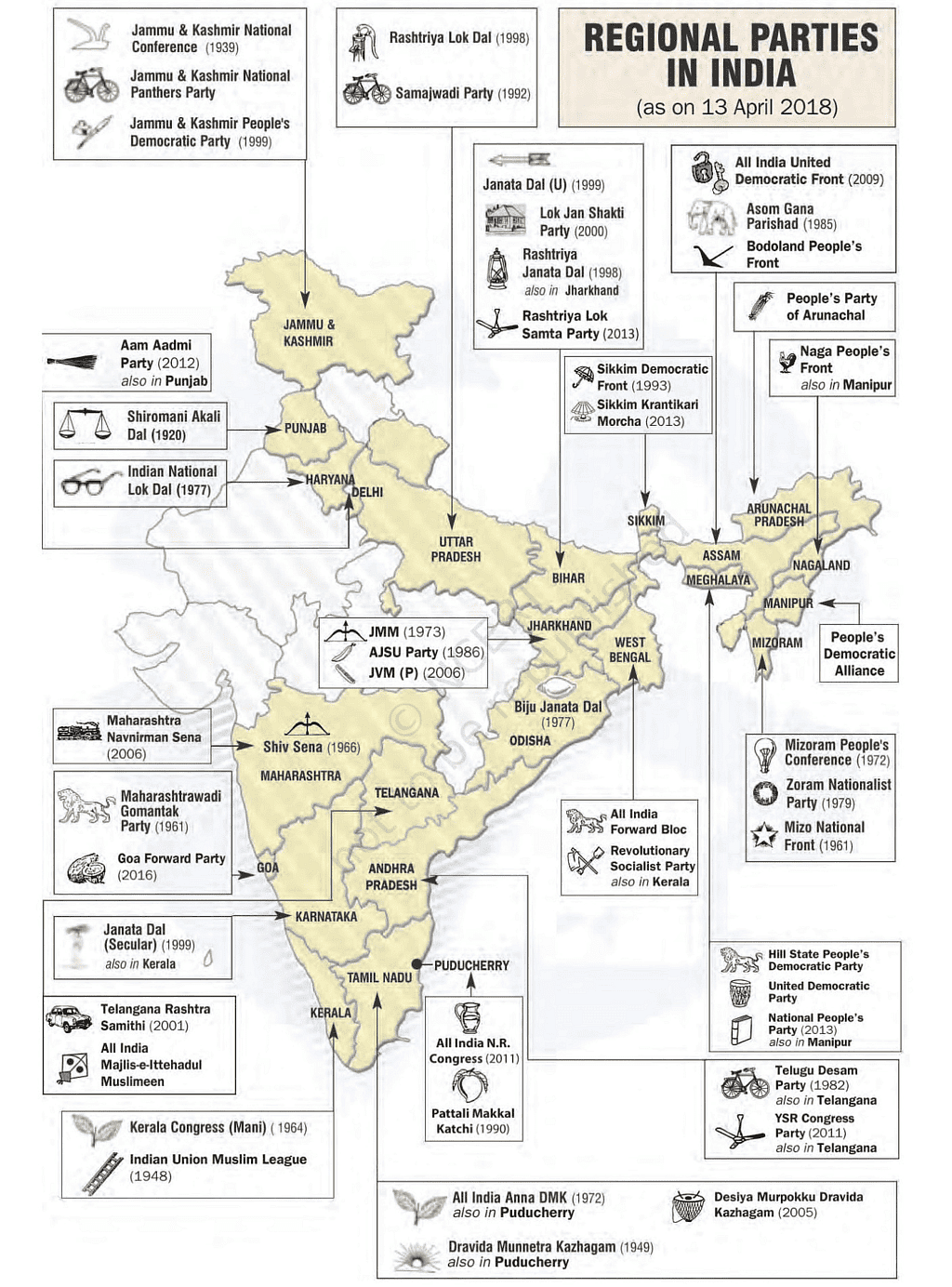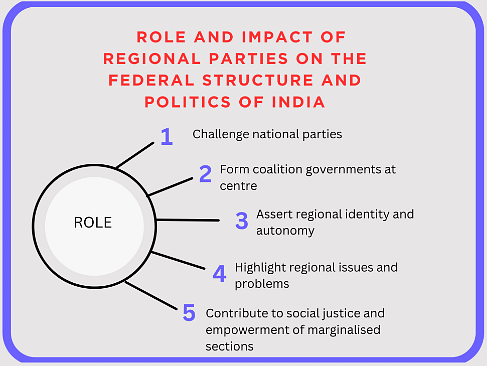Laxmikanth Summary: Role of Regional Parties | Indian Polity for UPSC CSE PDF Download
| Table of contents |

|
| Introduction |

|
| Features |

|
| Classification |

|
| Rise |

|
| Role |

|
| Dysfunction |

|
Introduction
Regional parties in India play a crucial role by representing diverse regional interests and influencing national coalition dynamics. Understanding these parties is essential for a comprehensive grasp of Indian politics and the intricate interplay between regional and national interests.

Features
- Limited Geographic Scope: Operates primarily within a specific state or region and Electoral support is concentrated in that particular area.
- Cultural or Ethnic Identification: Expresses and aligns with the interests of a specific cultural, religious, linguistic, or ethnic group.
- Addressing Local Discontent: It is Primarily concerned with addressing local issues and tapping into regional dissatisfaction.
- State-level Political Focus: Aims to capture political power at the state level rather than at the national level.
- Advocacy for Regional Autonomy: It holds a political desire for increased autonomy for its state within the broader Indian Union.Question for Laxmikanth Summary: Role of Regional PartiesTry yourself:What is a common characteristic of regional parties in India?View Solution
Classification
India has different regional parties, and we can group them into four categories:

1. Cultural or Ethnic Parties: Some parties focus on the culture or ethnicity of a specific region. Examples include Shiromani Akali Dal, National Conference, DMK, Telugu Desam, Shiv Sena, and Asom Gana Parishad.
2. Nationwide but Limited Influence Parties: Some parties look at national issues but don't have a strong presence across the country. Samajwadi Party and Nationalist Congress Party are examples.
3. Split from National Parties: Some regional parties emerge when there's a split within a national party. Biju Janata Dal, Rashtriya Janata Dal, Trinamool Congress, and YSR Congress fall into this category.
4. Personalized Parties: Some parties form around a charismatic leader rather than a specific ideology. These are often short-lived and are known as personalized parties.
Rise
Regional parties have gained importance in India because of various reasons like cultural differences, economic inequalities, historical factors, the self-interest of past rulers, unfulfilled regional aspirations by national parties, state reorganization based on language, influential regional leaders, internal issues within larger parties, the Congress party's centralizing tendencies, the absence of a robust central opposition, and the impact of caste, religion, tribal disconnection, and dissatisfaction in politics.
Role
The following points highlight the role played by the regional parties in Indian politics:

1. They have provided better governance and a stable government at the regional level.
2. They have posed a challenge to the one-party dominant system in the country and led to a decline in the domination of the Congress party"
3. They have made a strong impact on the nature and course of centre-state relations. The tension areas in center-state relations and the demand for the grant of greater autonomy made the central leadership more responsive to the needs of the regional actors.
4. They have made politics more competitive and popular participation in the political process more extensive at the grassroots".
5. They have increased the political consciousness of the people and also their interest in politics. They bring into focus the local or regional issues which immediately attract the attention of the masses.
6. They provided a check against the dictatorial tendencies of the central government. They opposed the ruling congress party at the center on certain issues and forced the dominant party to be more reasonable in its approach to the process of conflict resolution.
7. They have made a significant contribution to the successful functioning of parliamentary democracy. In a parliamentary democracy, the minority must have its say, the majority must have its way, and the regional parties have played this role successfully by being ruling parties in some states and opposition parties at the centre.
Dysfunction
- They often prioritize the interests of their specific region over the overall national interests. This narrow focus can lead to overlooking the broader implications of their decisions on national issues.
- Regional parties sometimes promote regionalism, caste-based politics, linguistic divisions, communalism, and tribalism, creating obstacles to national unity.
- They contribute to the unresolved nature of inter-state water disputes, border conflicts, and other issues between states.
- Corruption, nepotism, favoritism, and other forms of misuse of power are sometimes associated with regional parties as they pursue their self-interest.
- Regional parties tend to prioritize populist schemes to gain electoral support, which can negatively impact state economies and development.
- They introduce regional considerations into decision-making at the national level, often pressuring the central government to meet their demands in coalition setups.
|
147 videos|609 docs|204 tests
|
FAQs on Laxmikanth Summary: Role of Regional Parties - Indian Polity for UPSC CSE
| 1. What are the main features of regional parties in Indian politics? |  |
| 2. How are regional parties classified in Indian politics? |  |
| 3. What has been the rise of regional parties in Indian politics? |  |
| 4. What role do regional parties play in Indian politics? |  |
| 5. What are the common dysfunctions associated with regional parties in Indian politics? |  |

|
Explore Courses for UPSC exam
|

|












